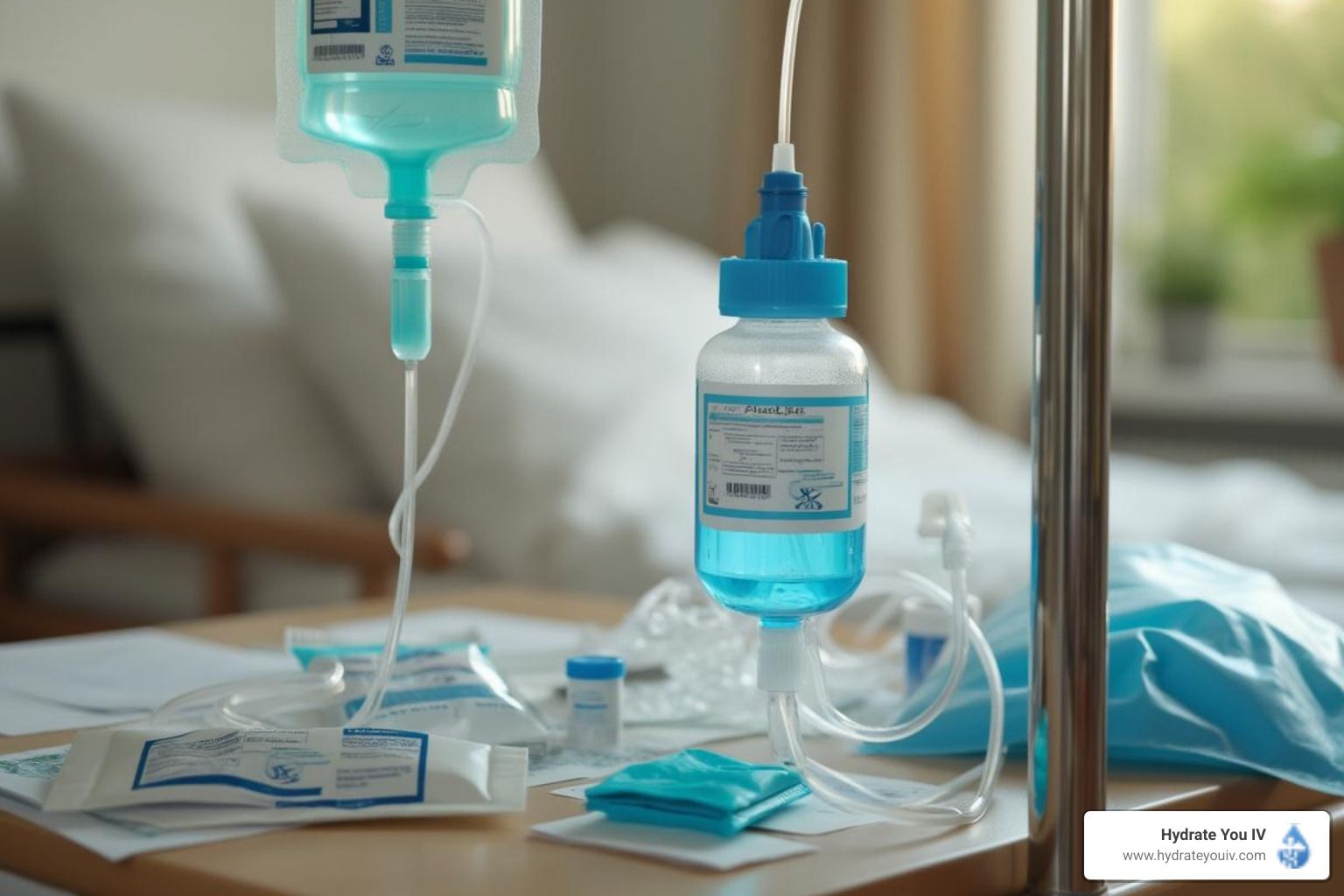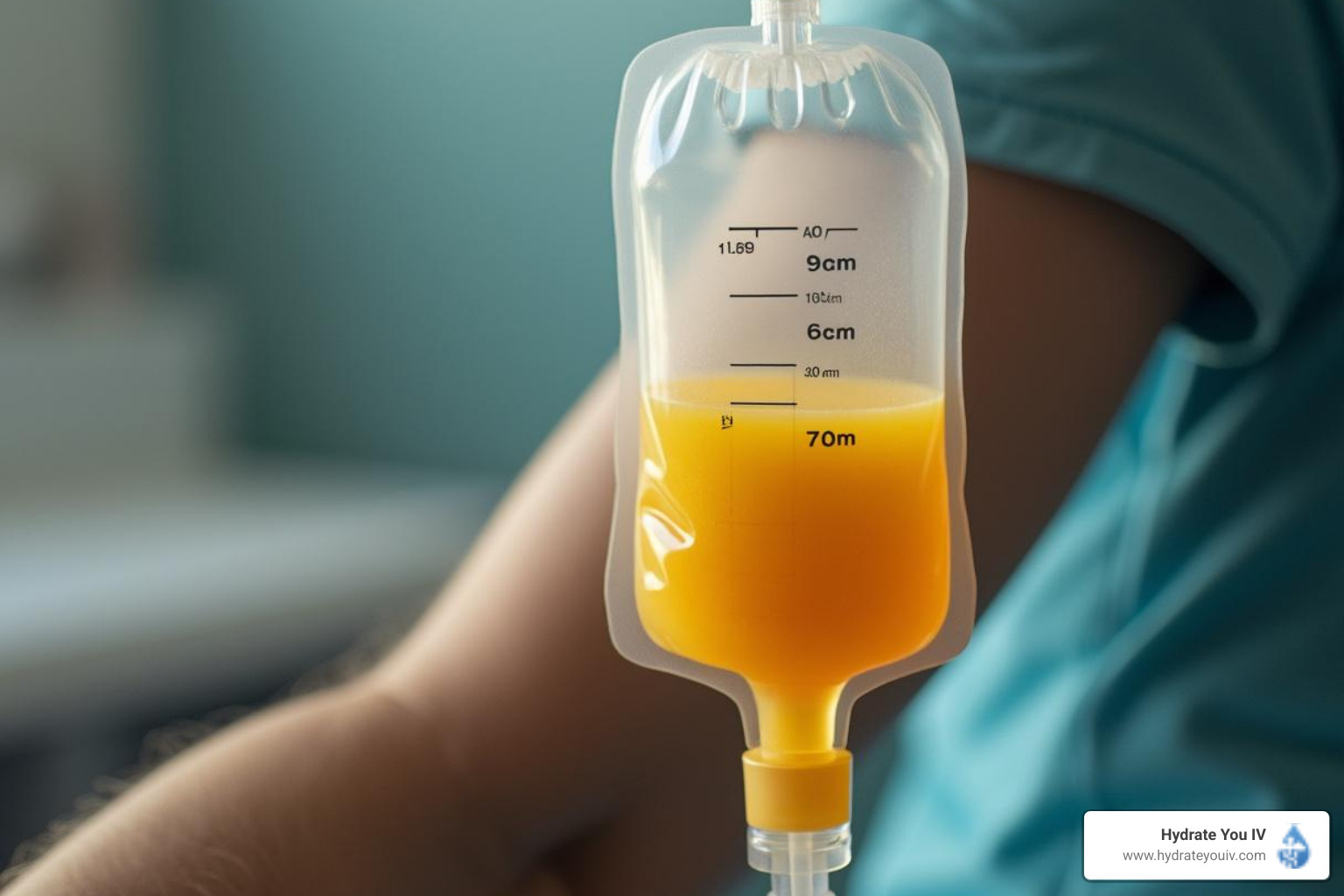How Often Should You Get IV Therapy? Safe Scheduling for Your Goals
If you’ve been wondering how often you should get IV therapy, you’re not alone. IV drips can support rapid hydration, steady energy, immune health, and recovery, but there’s no single timetable for everyone. Some people try short weekly phases during heavy training or busy seasons; others book only when they start to feel run down. The goal is a safe, personalized cadence that fits your body, goals, and routine.
At Hydrate You IV, our mobile, nurse-led team makes it simple. We come to you, help you choose a targeted drip with medical-grade add-ins like B12 or glutathione, and a licensed clinician recommends a sensible schedule so you get consistent results without overdoing it.
What Determines How Often You Should Get IV Therapy?
Determining the right IV therapy frequency depends on several overlapping factors, your goals, health status, lifestyle, and the type of drip you choose. Each of these elements shapes how often you should schedule a session, and together they create a personalized plan rather than a one-size-fits-all routine.
- Goals and Outcomes
Why you seek IV therapy sets the pace. Fatigue often calls for a short weekly reset for three to four weeks, followed by maintenance every two to four weeks. Immune support in cold and flu season may require weekly or biweekly drips, then tapering when risk is lower. For beauty and anti-aging, a monthly rhythm with optional glutathione add-ins balances results with consistency. Athletes typically match infusions to training cycles, scheduling weekly during heavy blocks or after competition, while hangovers or migraines usually need just one timely session.
- Health Status
Underlying health conditions influence how often you can drip safely. Clients with nutrient deficienciesor poor absorption may require closer spacing, while those with kidney, heart, or chronic conditions need extra caution and medical oversight. A clinician’s review ensures your schedule delivers results without overloading your system.
- Lifestyle Patterns
Your daily routine shapes the best cadence. Frequent travelers often book drips before and after flights to fight jet lag and dehydration. High-stress professionals sometimes benefit from weekly sessions during peak periods, then shift back to monthly once stress eases. Many clients also adjust seasonally, boosting immune-focused drips in winter and reducing frequency in calmer months.
- Type of Drip
Different formulations carry different timelines. Antioxidant blends like vitamin C and glutathione can be taken more often, even weekly if needed. NAD+ therapy usually follows a four-to-six-week cycle once the loading phase is complete. Treatments such as iron or high-dose vitamin C infusions are medical protocols that must follow provider-directed schedules.
- Specialized Use Cases
Certain goals call for unique rhythms. NAD+ therapy supports cognition and stamina when scheduled consistently every four to six weeks. Pregnancy-related nausea is addressed only under OB guidance, using hydration-forward formulas as needed. Some drips, like iron therapy, are strictly medical and set by lab work and prescriptions.
The bottom line: IV therapy is not one-size-fits-all. Start with a cadence that matches your primary goal—weekly for resets, monthly for maintenance, or single sessions for acute needs—then fine-tune based on how long results last, how your lifestyle shifts, and the guidance of a licensed professional.
How Long Do IV Therapy Benefits Last and When to Rebook?
IV therapy works quickly, but the duration of benefits depends on the formula, your health goals, and how your body responds. On average, most clients feel results within 30–60 minutes, with effects that can last from a few days up to two weeks.
- Hydration IVs (Normal Saline or Lactated Ringer’s): Relief is almost immediate, with hydration balance restored for 2–3 days. Many clients rebook weekly if they’re training, traveling, or recovering from illness.
- Immunity and Vitamin Boost Drips (Vitamin C, Zinc, B-Complex): Energy, mental clarity, and immune support often last 5–7 days. For ongoing wellness, rebook every 2–4 weeks, or more often during cold/flu season.
- NAD+ Therapy: After an initial loading phase, maintenance is usually every 4–6 weeks. Benefits for energy, focus, and recovery can extend up to a month.
- Beauty and Anti-Aging Drips (Glutathione, Vitamin C blends): Brightened skin and antioxidant support typically last 2–3 weeks. Monthly sessions are common for maintenance.
- Recovery and Performance Drips (Athletic or Hangover Relief): Results in less soreness, steadier hydration, improved focus, kick in fast and last 1–2 days. Many clients book around events or workouts rather than on a fixed schedule.
At Hydrate You IV, our licensed clinicians help you choose a cadence that matches your goals whether that’s a weekly reset, monthly wellness drip, or one-time recovery boost.
Who Should Avoid Frequent IV Therapy or Get Medical Clearance First
- People with heart failure or significant heart disease should avoid frequent IV therapy, since additional fluids can worsen congestion and overload, and only a clinician can decide if and when it is safe.
- Those with chronic kidney disease or a history of kidney stones need clearance before receiving drips, as reduced kidney function increases the risk of electrolyte imbalance and some nutrients, like high-dose vitamin C, can raise oxalate levels.
- Pregnant individuals must only receive IV therapy with obstetric guidance; while hydration may help with nausea, vitamin blends and add-ins should never be given without medical approval.
- Anyone undergoing protocol infusions such as iron or high-dose vitamin C must follow provider-directed schedules, since these treatments are based on lab values and require strict medical supervision.
- People on complex medication regimens, including diuretics, ACE inhibitors, or lithium should not self-schedule drips, as IV fluids and electrolytes can interact with their medications and alter blood pressure or serum levels.
- Those with liver disease, uncontrolled hypertension, or significant edema face higher risks when receiving fluids, making medical oversight essential to prevent complications.
- If someone has an active infection or unexplained fever, IV therapy should not be used to mask symptoms, and medical evaluation is required to ensure proper diagnosis and treatment.
- Clients with a history of vein irritation or difficult IV access should limit unnecessary frequency, as repeated cannulation can lead to phlebitis, bruising, and vein damage.
- Those considering specialized add-ins such as NAD+ or glutathione should seek medical guidance, as tolerance varies, side effects can occur, and spacing between sessions needs to be personalized.
How Hydrate You IV Determines Your Ideal IV Therapy Frequency

Hydrate You IV is mobile and nurse-led, we come to your home, hotel, office, gym, or event so you can adjust frequency during busy stretches (travel weeks, peak training) without the hassle of clinic visits, while a licensed nurse manages your infusion on site. Before any drip, a clinician reviews your health history, vitals, medications, and recent symptoms to set a safe starting interval and dosing plan; your cadence isn’t guesswork, it’s built around your body and risk profile.
We then match scheduling to real-world goals on our menu, hydration, immunity, athletic recovery, migraine/hangover relief, and more. Short recovery phases (immune flares, heavy training blocks) may call for tighter spacing, while maintenance aims (monthly beauty/skin or general wellness) usually need wider gaps. Formulation helps fine-tune timing: from Myers-style blends to hydration-focused options, plus add-ins like B12, glutathione, magnesium, or zinc, we can dial intensity up or down. A “heavier” session may carry you longer (so the next visit spaces farther out), whereas lighter support can be scheduled a bit closer if needed.
After each visit, we monitor results at 72 hours, one week, and two weeks to decide whether to extend, hold, or shorten your interval, and once you stabilize, we taper to the lowest effective cadence instead of locking you into weekly by default. If your situation requires protocol-level therapies (e.g., iron or high-dose vitamin C), we follow provider-directed labs and schedules so medical infusions remain distinct from wellness drips and your frequency stays aligned with clinical standards. This is how we safely personalize how often you should get IV therapy for your goals.











